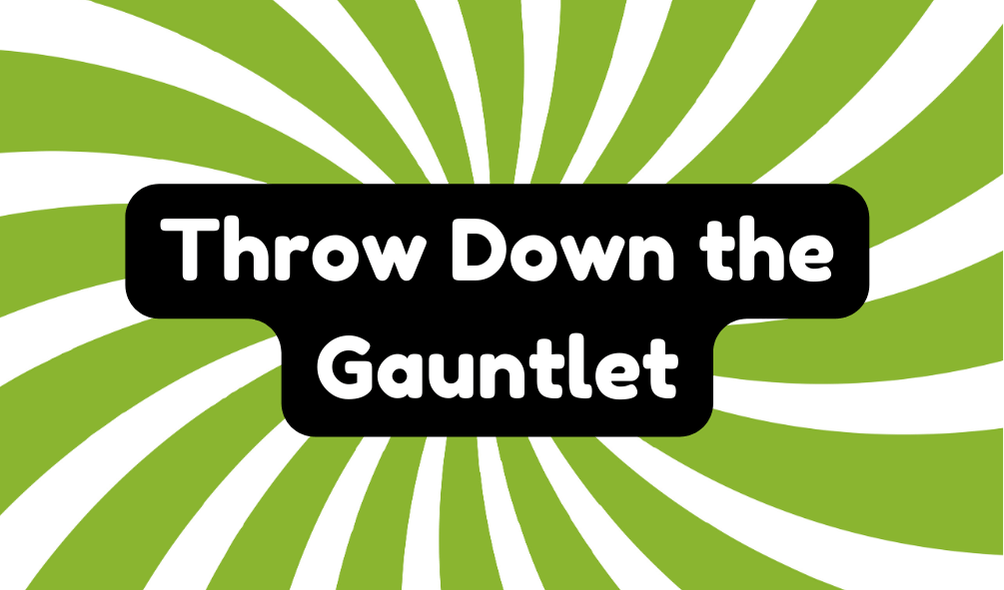When you "throw down the gauntlet," you're issuing a challenge, often in a competitive context. This phrase traces back to the 1500s, when knights literally tossed their gloves as a call to duel, demanding honor. Today, it's used to describe inviting someone to rise to the occasion or accept a challenge, whether in sports, business, or even classrooms. It's more than just a saying; it reflects a culture that values overcoming obstacles. You might be surprised at how often this applies to everyday situations, and there's more to discover about its impact and relevance today.
Synonyms
When you consider the act of issuing a challenge, you'll find several synonyms that capture the essence of "throwing down the gauntlet." Phrases like "take up the gauntlet" and "pick up the gauntlet" highlight challenge acceptance, while expressions like "rise to the occasion" and "step up to the plate" reflect a readiness to confront obstacles. Understanding these variations can help you navigate situations involving rivalry initiation and competition. Here are some key phrases to remember:
- "Take up the gauntlet"
- "Pick up the gauntlet"
- "Rise to the occasion"
- "Step up to the plate"
Recognizing these terms expands your vocabulary, helping you express ideas about accepting challenges and facing confrontations more effectively.
Example of Sentences
Issuing challenges can lead to compelling scenarios that test abilities and resolve. Think about the impact of challenges in various contexts. Here are some example scenarios where throwing down the gauntlet becomes essential:
- In sports, competitors often challenge each other to elevate performance.
- Teams in business need to throw down the gauntlet to innovate and adapt.
- Historical duels show how public challenges were used to prove honor.
- In classrooms, students may issue challenges to encourage collaboration and creativity.
These scenarios demonstrate that accepting or issuing a challenge isn't just about competition; it's about growth and pushing boundaries. Whether in personal or professional domains, facing challenges can reveal true potential, leading to unexpected successes or valuable lessons.
Origin
The phrase "throw down the gauntlet" has a fascinating historical origin that dates back to the 1500s. You should know that the term "gauntlet" comes from the French word "gantelet," which referred to the protective gloves worn by knights. In this historical context, a knight would throw down their gauntlet to challenge an opponent to a duel, signaling a demand for honor. This act transformed into an insult when the glove was tossed at someone's feet, provoking a fight. By the 1700s, metaphorical interpretations emerged, allowing the phrase to symbolize challenges beyond physical confrontations. Understanding this origin not only enriches your vocabulary but also deepens your appreciation for how language evolves with societal norms.
Collocations
Various collocations commonly accompany the phrase "throw down the gauntlet," enhancing its expressive power in different contexts. Understanding these collocations can help you navigate competitive scenarios effectively. Here are a few examples that highlight the concept of a gauntlet challenge and the competitive spirit:
- "accept the gauntlet challenge"
- "rise to the gauntlet"
- "issue a gauntlet challenge"
- "accept the challenge"
Using these phrases strategically can elevate your communication, showcasing not just your intention but also your confidence. Yet, be cautious; throwing down the gauntlet can provoke unintended consequences. A challenge invites others to respond, and the competitive spirit must be carefully managed. Embrace these collocations, but always be prepared for the arena's response!
How to Use in Everyday Language
In conversations filled with competition or challenge, throwing down the gauntlet can add a dynamic edge. When you're looking to spark rivalry initiation, use this phrase to provoke others; it's more than just talk. For example, you might say, "I'm ready to tackle this project; who wants to join me?" This encourages challenge acceptance and sets a tone for collaboration, even amidst competition. Be mindful, though; not everyone will respond positively. Some may shy away from confrontation. Using this phrase effectively requires awareness of your audience and the context. So, choose your moment wisely—if you throw down the gauntlet, be prepared to face the consequences, whether they lead to innovative discussions or unexpected tensions.
Why Is It Still Relevant Today?
Challenge culture thrives in today's fast-paced world, making the phrase "throw down the gauntlet" exceptionally relevant. In innovation-driven environments, you often face pressures that challenge personal and professional limits. The cultural implications are significant; issuing challenges can foster creativity and resilience.
| Cultural Implications | Modern Applications | Impact on Society |
|---|---|---|
| Encourages innovation | In business strategies | Unites diverse ideas |
| Promotes competition | Sports events | Drives social change |
| Calls for accountability | Community initiatives | Inspires action |
Understanding this phrase's relevance helps you engage with challenges head-on and encourages others to take risks. In a world demanding innovation, embracing the gauntlet can transform hurdles into growth opportunities.







